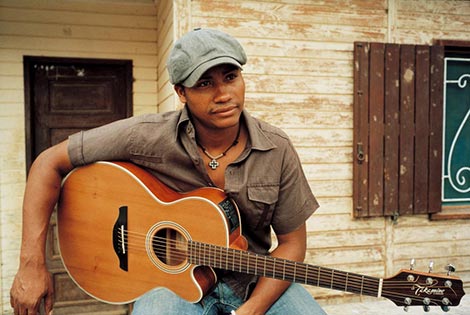Tcheka
Country Cape Verde Genres roots Website /tcheka.cv Festival Sauti za Busara 2015 Recordings 📼 Dor De Mar (2011); Lonji (2007); Nu Monda (2005); Argui! (2002)
Tcheka was born Manuel Lopes Andrade in 1973 in Ribeira da Barca, a small rural town on the coast of Santiago island, Cape Verde, whose modest economy is based on farming and fishing. He was the second-to-last child in a large musical family. His father, Nho Raul Andrade, was a renowned violinist in the area who taught music to his sons and eventually created a small family band that played at local weddings, funerals and baptism festivities. Tcheka says he learned to play the acoustic guitar under duress at age 8, and by age 9, he was playing in the family band under the stern direction of his father.
Like so many young Cape Verdeans, Tcheka’s secondary education had to be cut short because his family could not afford it, so his teenage years were spent fishing, diving and exploring the coast around his hometown. It was during this period he also began composing songs. Surrounded by the jagged, ominous shapes of the Serra Malagueta Mountains and the dark, billowy sea, Ribeira da Barca proved the ideal landscape in which the artist could construct his unique vision.
Tcheka’s first stint in a non-musical profession became, arguably, the thing most responsible for widening the scope of his musical artistry. In 1991, at the age of 18, he landed a job as a camera assistant at the national television station (then TNCV) in Cape Verde’s capital city, Praia. From 1991 to 2000, Tcheka worked as a cameraman while playing nightly gigs with friends in small bars, hotels and restaurants around the capital. His first recording Maân ba des des kumida da? [Will there be a harvest this time?] appeared on the benefit compilation CD Cap Vert Les Enfants (1999) while he was still operating camera for TNCV, but he remained in relative obscurity, still committed to his full time job.
A major turning point in his career came with the 2000 release of another compilation CD Ayan: New Music from Cape Verde. Among Tcheka’s three contributions to this groundbreaking project was the original version of Primeru bes kin ba Cinema [The first time I went to the Cinema] in which he recounts, with levity and great detail, the moment he first saw motion picture. The song not only re-imagines that moment as a sudden, frightening and irrevocable loss of innocence to the seductive illusions of the screen, a decidedly formative moment for Tcheka, but it also establishes the visual as the predominant theme and narrative methodology of his compositions. Tcheka describes his creative process thus: ‘When I create a song, it is like a sequence of images, like the frames of a film, before my eyes. The melody is itself a story I actually see in my head, and then I write the lyrics according to that vision’. Indeed, what immediately distinguishes Tcheka from other Cape Verdean composers is the idiosyncratic and non-linear approach he takes in structuring his songs, often with abrupt shifts in tempo, melody, lyrical subject and mood, suggestive of the quick cuts and scene transitions of a film.
The release of Argui! [Get up] (2002), his first solo album, solidified his reputation in Cape Verde as a guitar virtuoso and an original, soulful songwriter, and its success forced Tcheka into music full time. In 2005 he entered the prestigious Radio France International Decouverte Musiques du Monde Competition held in Dakar, Senegal, and competed against some of the leading artists in contemporary African music. Needless to say, he returned home to Cape Verde with first prize and, finally, national and regional stardom. It was, however, the critically acclaimed Nu Monda (2005) that shot him into the stratosphere of world music, and started tongues wagging at home and abroad about him being the true ‘vanguard’ of Cape Verdean music.
In the album, Lonji [Far Away], Tcheka journeys even deeper into experimental territory. With Brazilian acoustic rock superstar Lenine as producer, he stays true to his richly textured acoustic chords and Afro-Creole rhythms, while incorporating more electronic elements and ambient sounds that lend the tracks a fresh, futuristic sensibility. Some of the familiar sensations explored on previous recordings are also further enhanced here: there is the cool, aquatic feel of the new version of Primeru bes kin ba Cinema; the heat, tension and suspense of Lingua Pretu [Black Tongue] and Ana Maria; and the surreal and atmospheric Lonji. There is also a greater percussive insistency on this record; an unusual collision of Cape Verdean, West African and Afro-Brazilian percussion that is, at times, soft, tinkling and playful, and at other times, brash and thunderous. What is carefully preserved, though, is the vivid lyricism conveyed by Tcheka’s vocals that still ring with tenderness and vulnerability.
Tcheka is undoubtedly a young master of an art that he has invented, and like any true master, his essence is impossible to grasp, let alone pin down. Contrary to journalistic opinion, he is neither modernist, nor traditionalist, and his music resists any easy categorization or comparison. While referencing multiple Cape Verdean genres (batuku, funana, finason, tabanka, morna and coladera), Tcheka’s music is also a busy intersection of Caribbean, Brazilian and African pop and traditional forms, folk, jazz, blues, rock, literature, anthropology and film. It is never just Santiaguense, never just Cape Verdean, and never just music.
Perhaps what Tcheka presents is an entirely new vision of what it means to be Creole in the age of globalisation: to be a hybrid product of the historical forces of slavery, colonialism and national independence, but at the same time, to be deeply affected by post-modern forces as well by the growing inevitability of travel and trans-national encounters, by the emergence of new regimes of knowledge, art and capitalism and by the increasing inseparability of technology and the human imagination.
 with support from Learn Africa
with support from Learn Africa
Algeria Angola Australia Austria Benin Burkina Faso Burundi Cameroon Canada Cape Verde Comoros Congo Côte d'Ivoire Denmark DRC Egypt eSwatini Ethiopia Far East Finland France Gambia Germany Ghana Guinea Guinea Bissau Iraq Japan Kenya Lesotho Madagascar Malawi Mali Mauritania Mauritius Mayotte Morocco Mozambique Namibia Netherlands Nigeria Norway Pan Africa Pemba Puerto Rico Reunion Rwanda Senegal Seychelles Somaliland South Africa Sudan Suriname Sweden Switzerland Tanzania Uganda UK USA Various Yemen Zambia Zanzibar Zimbabwe
acoustic acrobats afrobeat band blues bongo flava coastal comedy dance dj electro fusion hiphop jazz kidumbak pop reggae rock roots rumba spiritual spoken word taarab traditional urban zenji flava


 Kwa kiswahili bofya hapa>>>
Kwa kiswahili bofya hapa>>>